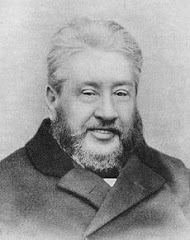
“A bruised reed he shall not break, and smoking flax (wick) he shall not quench…” Matthew 12:20
The smoking flax I conceive to be a backsliding Christian; one who has been a burning and a shining light in his day, but by neglect of the means of grace,…falling into sin, his light is almost gone out—not quite—it can never go out, for Christ saith, “I will not quench it;” but it becomes like a lamp when ill supplied with oil—almost useless. It is not quite extinguished; it smokes; it was a useful lamp once, but now it has become as smoking flax.
And first, the encouragement offered in our text applies to weak ones. What in the world is weaker than the bruised reed, or the smoking flax? A reed that growth in the fen or marsh, let but the wild duck light upon it, and it snaps; let but the foot of man brush against it, and it is bruised and broken; every wind that comes howling across the river makes it shake to and fro, and well-nigh tears it up by the roots. You can conceive of nothing more frail and brittle, or whose existence depends more upon circumstances than a bruised reed. Then look at smoking flax—what is it? It has a spark within it, it is true, but it is almost smothered; an infant’s breath might blow it out; or the tears of a maiden quench it in a moment; nothing has a more precarious existence than the little spark hidden iin the smoking flax. Weak things, you see, are here described. Well, Christ says of the, “The smoking flax I will not quench; the bruised reed I will not break.”
Some of God’s children, blessed be his name, are made strong to do might works for him; God has his Samson’s here and there who can pull up Gaza’s gates, and carry them to the top of the hill’ he has here and there his mighty Gideon’s, who can go to the camp of the Midianites, and overthrow their hosts; he has his might men, who can go into the pit in winter, and slay the lions; but the majority of his people are a timid, weak race. They are like the starlings, that are frightened by every passer by; a little fearful flock. If temptation comes, they fall before it; if trial comes, they are overwhelmed by it;….Ah! dear friends, I know I have got hold of some of your hands now, and your hearts too; for you are saying, “Weak! Ah, that I am. Full often I am constrained to say, I would, but can not sing; I would, but can not pray; I would, but can not believe.” You are saying that you can not do any thing; your best resolves are weak and vain; and when you cry, “My strength renew.” You feel weaker than before. You are weak, are you? Bruised reeds and smoking flax? Blessed be God, this text is for you then. I am glad you can come in under the denomination of weak ones, for here is a promise that he will never break nor quench them, but will sustain and hold them up.
Ah, remember Mary Magdalene’s voice in heaven, I imagine, sounds more sweet and liquid than any other; and the voice of that poor thief, who said “Lord, remember me,” if it is a deep bass voice, is more mellow and more sweet than the voice of any other, because he loved much, for he had much forgiven him. This reed may yet be of use. Do not say you are good for nothing; you shall sing up in heaven, yet. Do not say you are worthless; at last you shall stand before the throne among the blood-washed company, and shall sing God’s praise. What good can come from the smoking flax? I will tell you soon. There is a spark in that flax somewhere; it is nearly out, but still a spark remains. Behold the prairie on fire! See you the flames come rolling on? See you stream after stream of hot fire deluging the plain till all the continent is burned and scorched—till heaven is reddened with flame. Old night’s black face is scarred with the burning, and the stars appear affrighted at the conflagration. How was that mass ignited! By a piece of smoking flax dropped by some traveler, fanned by the soft wind, till the whole prairie caught the flame. So one poor man, one ignorant man, one weak man, even one backsliding man, may be the means of the conversion of a whole nation. Who knows but that you who are nothing now, may be of more use than those of us who appear to stand better before God, because we have more gifts and talents? God can make a spark set a world on fire—he can light up a whole nation with the spark of one poor praying soul. You may be useful yet; therefore, be of good cheer. Moss grows upon gravestones; the ivy clings to the moldering pile; the mistletoe grows on the dead branch; and even so shall grace, and piety, and virtue, and holiness, and goodness, come from the smoking flax and bruised reeds. When he says to the backslider that he will not quench him, he means more than that—he means that he will fan him up to a flame. Some of you, I dare say, have gone home from chapel and found that your fire had gone early out; I know how you deal with it; you blow gently at the single spark, if there is one, and lest you should blow to hard, you hold your fingers before it; and if you were alone and had but one match, or one spark in the tinder, how gently would you blow it. So, backslider, Jesus Christ deals with you; he does not put you out; he blows gently; he says. “I will not quench thee;” he means. “I will be very tender, very cautious, and very careful; he will put on dry material, so that by-and-by a little spark shall come to a flame, and blaze up toward heaven, and great shall be the fire thereof.
 "And if you call on him as Father who judges ..."
"And if you call on him as Father who judges ..."








